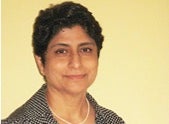Obesity rates in the United States continue to skyrocket from decade to decade. And while awareness for this issue has been growing in recent years, so have the waistlines of many Americans.
As part of the effort to combat this health epidemic, ASU has created a Master of Science in Obesity Prevention and Management program that aims to equip health professionals with a complex, holistic view of the causes of obesity.
Punam Ohri-Vachaspati (pictured at left), who leads the program, describes the master's in obesity as an innovative, interdisciplinary degree that integrates perspectives from the social, applied, life and health sciences to provide students with the skills and knowledge necessary to develop effective obesity solutions for individuals and communities.
And, to be clear, this program doesn’t advocate any one particular method for weight loss. Rather, it stresses the complexities of obesity and how important it is to treat it with a multidisciplinary approach encompassing the social, cultural, health, environmental and psychological issues associated with obesity.
“Our students are risk takers — this is a new type of degree, and they are eager to be pioneers,” said Ohri-Vachaspati, an associate professor of nutrition in ASU’s School of Nutrition and Health Promotion in the College of Health Solutions.
Program graduate Libby Dachenhaus is one of these pioneers.
“The concept of the program is incredibly unique,” Dachenhaus said. “Its development reflects the demand for more professionals in multiple fields to become more competent in addressing obesity.”
Students delve into the complex factors underlying obesity throughout the program, starting with an introductory course that brings in ASU faculty members and external experts from many disciplines.
“In an introductory course, after learning some basics about obesity, students have the opportunity to learn about various perspectives on obesity from 15 to 20 experts in various areas from physical activity, nutrition, law, anthropology and psychology, among others,” Ohri-Vachaspati said. “This course then guides students to choose courses that align with their interests. Students also do a thesis or an applied project where they focus on designing an intervention or undertake research in a community setting in the area of obesity prevention and management.”
A major goal of the program is to help prepare a workforce that understands the complexity of obesity.
“Prevention is an approach that is being advocated. But with a large segment of the population already obese, new ways of thinking about solutions in a multidisciplinary ways is warranted,” Ohri-Vachaspati said. “It is important that the emerging health-related workforce understands the complex origins of obesity and appreciates why it is important to address this problem on multiple fronts.”
That’s why Theresa Hart enrolled in the program. As a nurse with 24 years of experience, Hart said she was left longing for a deeper understanding of the root causes of illness.
“I would take care of these patients but I felt that we, as a health-care team, were only treating symptoms and not getting to the underlying issues of why these patients were so sick,” Hart said. “I believe in prevention and would like to be a health-care professional who promotes health.”
The program, which began in 2014, is a joint effort of Mayo Clinic-ASU Obesity Solutions and the School of Nutrition and Health Promotion. It has graduated two students to date with 11 currently enrolled. For more information, visit https://chs.asu.edu/snhp/master-science-obesity-prevention-management.
More Health and medicine

The science of sibling dynamics: Why we fight, how we relate and why it matters
We have Mother’s Day, Father’s Day and even Grandparents’ Day. But siblings? Usually they get a hand-me-down sweatshirt and, with any luck, a lifetime of inside jokes.But actually, there is a…

New study seeks to combat national kidney shortage, improve availability for organ transplants
Chronic kidney disease affects one in seven adults in the United States. For two in 1,000 Americans, this disease will advance to kidney failure.End-stage renal failure has two primary…

New initiative aims to make nursing degrees more accessible
Isabella Koklys is graduating in December, so she won’t be one of the students using the Edson College of Nursing and Health Innovation's mobile simulation unit that was launched Wednesday at Arizona…



